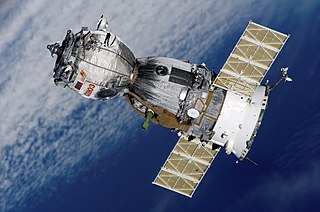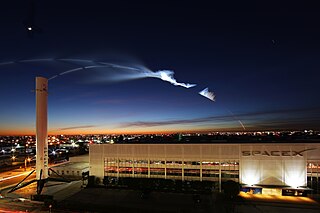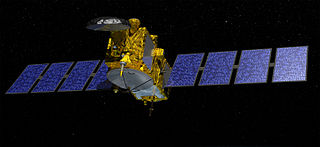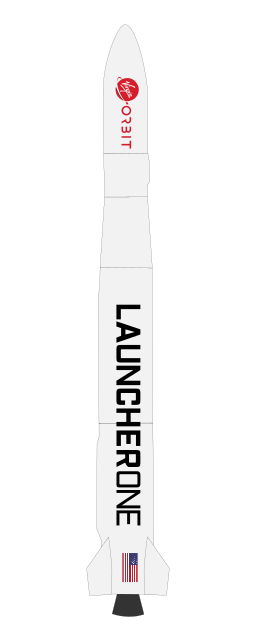
In the context of spaceflight, a satellite is an artificial object which has been intentionally placed into orbit. Such objects are sometimes called artificial satellites to distinguish them from natural satellites such as Earth's Moon.

DigitalGlobe is an American commercial vendor of space imagery and geospatial content, and operator of civilian remote sensing spacecraft. The company went public on the New York Stock Exchange on 14 May 2009, selling 14.7 million shares at $19.00 each to raise $279 million in capital. On 5 October 2017, Maxar Technologies completed its acquisition of DigitalGlobe.

Space Exploration Technologies Corp., doing business as SpaceX, is a private American aerospace manufacturer and space transportation services company headquartered in Hawthorne, California. It was founded in 2002 by entrepreneur Elon Musk with the goal of reducing space transportation costs and enabling the colonization of Mars. SpaceX has since developed the Falcon launch vehicle family and the Dragon spacecraft family, which both currently deliver payloads into Earth orbit.

Small satellites, miniaturized satellites, or smallsats, are satellites of low mass and size, usually under 500 kg (1,100 lb). While all such satellites can be referred to as "small", different classifications are used to categorize them based on mass. Satellites can be built small to reduce the large economic cost of launch vehicles and the costs associated with construction. Miniature satellites, especially in large numbers, may be more useful than fewer, larger ones for some purposes – for example, gathering of scientific data and radio relay. Technical challenges in the construction of small satellites may include the lack of sufficient power storage or of room for a propulsion system.

Soyuz-2, GRAU index 14A14, is the collective designation for the 21st-century version of the Russian Soyuz rocket. In its basic form, it is a three-stage carrier rocket for placing payloads into low Earth orbit. The first-stage boosters and two core stages feature uprated engines with improved injection systems, compared to the previous versions of the Soyuz. Digital flight control and telemetry systems allow the rocket to be launched from a fixed launch platform, whereas the launch platforms for earlier Soyuz rockets had to be rotated as the rocket could not perform a roll to change its heading in flight.
Nimiq 5 is a Canadian communications satellite, operated by Telesat Canada as part of its Nimiq fleet of satellites. It is positioned in geostationary orbit at a longitude of 72.7° West of the Greenwich Meridian. As of July 2015, EchoStar Corporation leases the satellite's entire capacity to provide High Definition television direct-to-home broadcasting for Dish Network Corporation. When accessed using a multi-satellite receiver such as the VIP722k and a multi-satellite dish/LNB combo, such as the Dish-300, Dish-500, or Dish-Turbo 1000.4, the satellite is (incorrectly) referred to by the on-screen diagnostics as Echostar 72W.

Jason-3 is a satellite created by a partnership of the European Organisation for the Exploration of Meteorological Satellites (EUMESTAT) and National Aeronautic and Space Administration (NASA), and is an international cooperative mission in which NOAA is partnering with the Centre National d'Etudes Spatiales. The satellites' mission is to supply data for scientific, commercial, and practical applications to sea level rise, sea surface temperature, ocean temperature circulation, and climate change.

LauncherOne is a two stage orbital launch vehicle under development by Virgin Orbit since 2007. It is an air launch to orbit rocket, designed to launch "smallsat" payloads of 300 kilograms (660 lb) into Sun-synchronous orbit, following air launch from a carrier aircraft at high altitude. Launches are projected to begin in early 2019.

Cygnus CRS Orb-3, also known as Orbital Sciences CRS Flight 3 or Orbital 3, was an attempted flight of Cygnus, an automated cargo spacecraft developed by United States-based company Orbital Sciences, on 28 October 2014. This flight, which would have been its fourth to the International Space Station and the fifth of an Antares launch vehicle, resulted in the Antares rocket exploding seconds after liftoff.
EduSAT is an Italian microsatellite which was launched in August 2011. The satellite was built and is operated by the Sapienza University of Rome in conjunction with the Italian Space Agency ASI, and is primarily used for educational outreach and technology demonstration.

Soyuz at the Guiana Space Centre is an ongoing ESA programme for operating Soyuz-ST launch vehicles from Guiana Space Centre (CSG), providing medium-size launch capability for Arianespace to accompany the light Vega and heavy-lift Ariane 5. The Soyuz vehicle is supplied by the Russian Federal Space Agency with TsSKB-Progress and NPO Lavochkin, while additional components are supplied by Airbus, Thales Group and RUAG.

littleBits is a New York City-based startup that makes an open source library of modular electronics, which snap together with small magnets for prototyping and learning. The company’s goal is to democratize hardware the way software and printing have been democratized. The littleBits mission is to "put the power of electronics in the hands of everyone, and to break down complex technologies so that anyone can build, prototype, and invent." littleBits units are available in more than 70 countries and used in more than 2,000 schools. The company was named to CNN’s 10 Startups to Watch for 2013.
Intelsat 29e, also known as IS-29e is a high throughput geostationary communications satellite designed and manufactured by Boeing on the BSS-702MP platform. It is the first satellite of the EpicNG service, and covers CONUS, Latin America and North America from the 50° West longitude, where it is replaced Intelsat 1R. It also replaced Intelsat 805 which was moved from 56.5° West to 169° East. It has a mixed C band, Ku band and Ka band payload with all bands featuring wide and the Ku also featuring spot beams.

Sentinel-2B is a European optical imaging satellite that was launched on 7 March 2017. It is the second Sentinel-2 satellite launched as part of the European Space Agency's Copernicus Programme, and its orbit will be phased 180° degrees against Sentinel-2A. The satellite carries a wide swath high-resolution multispectral imager with 13 spectral bands. It will provide information for agriculture and forestry, among others allowing for prediction of crop yields.

This is a corporate history of SpaceX, an American aerospace manufacturer and space transport services company founded by Elon Musk.
Alba Orbital, is a British company building PocketQube satellites. Alba Orbital is the developer and manufacturer of the Unicorn-1 and Unicorn-2 satellite platforms. Alba Orbital was named in 2015 by CNN as one of the top 10 startups to watch.. Alba Orbital was founded in 2012 following on from a successful Kickstarter campaign.














